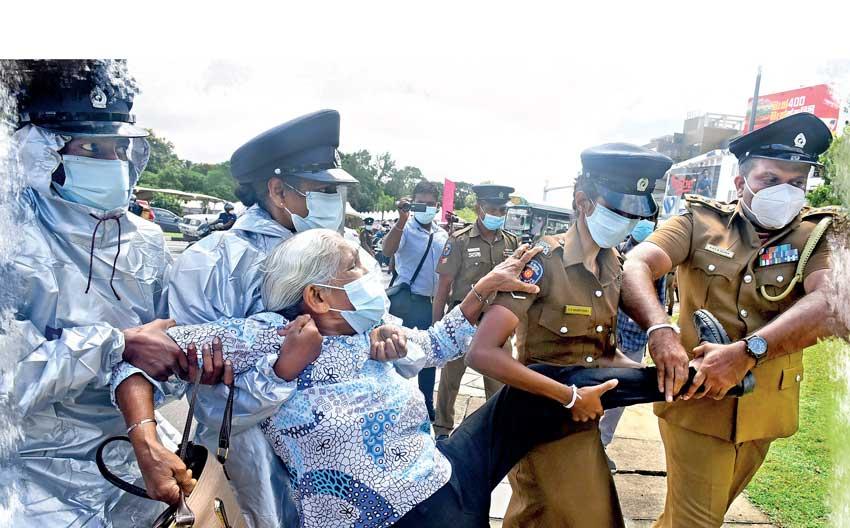• Officers are rarely prosecuted for misconduct, including the brutal use of force on citizens. In rare cases, officers found guilty are given minor disciplinary punishments or given warnings.
• The NPC received a total of Rs.127, 764, 000 budgetary allocation in 2018 which was more than double what it had received in the year 2015 — Rs.47, 030, 000. However, statistics indicate that the commission has failed to fulfil one of the complementary functions — transforming the Sri Lanka Police into an efficient, transparent, and responsive service that upholds Human Rights, ensures public accountability, and adheres to the Rule of Law.
• According to information obtained through an RTI by the writer, the rate of complaints at NPC being stuck with no progress has been increasing over the last five years. From the 2017 to June 30, 2022 time period, the total numbers of unsolved complaints were 5, 21, 96, 276, 1344, and 713, respectively. When asked about the delay, the NPC blamed the Covid-19 pandemic.
• It revealed that mechanisms to hold State actors to account for their actions have been eroded; checks on the arbitrary use of power have been diluted, if not dissolved; and even institutions to protect the Independence of the Judiciary have been eviscerated.


Nine Thousand Two Hundred Ninety Five (9295). That is the number of public complaints that have been lodged against Sri Lanka Police with the National Police Commission (NPC) during the last five years. These complaints include cases of unlawful arrest, false charges, assault, torture, partiality, abuse of power, as well as Police inaction.
This number on record is small compared to the actual number of incidents taking place on the streets of Sri Lanka daily. Even with this high number of reported cases of Police violence and misconduct, one would expect the conviction rate and solving of complaints to be high as well, since there is a dedicated oversight body named the National Police Commission (NPC) that is responsible for ensuring that the Police are accountable for their acts of violence.
However, officers are rarely prosecuted for misconduct, including the brutal use of force on citizens. In rare cases, officers found guilty are given minor disciplinary punishments or given warnings. “Police officers don’t believe that they are ever going to be held accountable for what they do on the streets,” Basil Fernando, Director for Policy and Programme, Asian Human Rights Commission, said.
Increasing rate of unsolved cases
Although armed with the power of the State and empowered to use force against ordinary citizens, Police is accountable like any organization or any ordinary citizen. According to the Police Media Spokesman SSP Nihal Thalduwa, Sri Lanka Police also does have an internal system to hear complaints against cops. In fact, internal management mechanisms if well implemented can be a powerful way of holding police officers to account. But is it enough? Has the internal system ever commanded the full confidence of the public?
The National Police Commission was established under the 19th Amendment to the Constitution in October 2015 with a mission to safeguard the public from unlawful action and/or inaction by the Police. Annually more and more public money is being spent to maintain the operations of the NPC only to see the performance of the Commission becoming more questionable over the years.
According to its Annual Expenditure Reports, the NPC received a total of Rs.127,764,000 budgetary allocation in 2018 which was more than double what it had received in the year 2015 — Rs.47, 030,000. However, statistics indicate that the commission has failed to fulfil one of the complementary functions — transforming the Sri Lanka Police into an efficient, transparent, and responsive service that upholds Human Rights, ensures public accountability, and adheres to the Rule of Law.
According to information obtained through an RTI by the writer, the rate of complaints at NPC being stuck with no progress has been increasing over the last five years. From the 2017 to June 30, 2022 time period, the total numbers of unsolved complaints were 5, 21, 96, 276, 1344, and 713, respectively. When asked about the delay, the NPC blamed the Covid-19 pandemic.

Even the resolved cases are not technically resolved. A source at the NPC revealed that a considerable number of resolved cases are those in which the aggrieved parties stopped contributing to the inquiry “for reasons best known to them.” When the complainant no longer participates in the inquiry, the NPC stops pursuing such cases due to a “lack of evidence”. These numbers show that Sri Lanka not only inherited the culture of Police brutality from the past but also the acceptance of this kind of unfair behaviour because the Police are not held accountable for their illegal actions.
“The National Police Commission is an eyewash.
When a person’s lungs fail due to respiratory disease, they try to get oxygen from an external machine, which is a temporary method to keep the person alive. The NPC is also like an external oxygen machine.
The root cause of the problems with Police in the country—a lack of strong work culture. I have been observing the performance of NPC since its inception. There is nothing we can say we are happy about this institution. It only has paper power. The Sri Lanka Police is a very powerful institution. What NPC is doing is just public relations work for the Police.”
Are independent commissions really independent?

Renowned academic Professor Siri Hettige, who had been appointed to the post of the Chairman of the National Police Commission in 2016, didn’t stay in his post for over a year. In January 2017, he resigned, citing an academic commitment. Speaking to the media, Prof. Hettige compared the attempt to overhaul an institution to “similar to rehabilitating an alcoholic.”
When he was working, he had initiated a series of joint action plans in order to address outstanding issues, including the elimination of corruption and impunity within the NPC. In a brief interview with the Daily Mirror, Prof. Hettige talked about how most of Sri Lanka’s democratic institutions have become less independent and less effective over time. “This decline in the independence and effectiveness of the democratic institutions, including the Police and the Public Service, has made these institutions obsolete.”
“When I was Chair, I tried to make a few changes. In fact, I did some initial things which didn’t see the light of the day. Then I resigned,” Prof. Hettige said. He went on to say that there is no point in talking about these Independent Commissions now because they are no longer independent.
He criticised that under the present system of governance, the rule of law, transparency, and accountability are no longer visible. “The institutional fabric, which is a very important factor in a country, is severely damaged,” he opined.
Sri Lanka Police lacks a strong work culture
In a report titled “Authority without Accountability: the Crisis of Impunity in Sri Lanka,” the International Commission of Jurists revealed in 2021 that in Sri Lanka, impunity has over the years become institutionalised and systematized. It revealed that mechanisms to hold State actors to account for their actions have been eroded; checks on the arbitrary use of power have been diluted, if not dissolved; and even institutions to protect the Independence of the Judiciary have been eviscerated.
Speaking to the Daily Mirror, Director for Policy and Programme, Asian Human Rights Commission Attorney at Law, Basil Fernando, said, like other experts in the use of force, minimum force is the first principle. “This is a very important principle to follow because Police officers hold people’s lives in their hands. Their duty is to protect lives, not to take them,” he said.
“The root cause of the problems with Police in the country—a lack of strong work culture. I have been observing the performance of NPC since its inception. There is nothing we can say we are happy about this institution. It only has paper power. The Sri Lanka Police is a very powerful institution. What NPC is doing is just public relations work for the Police.”
Attorney Basil Fernando underlined that the NPC lacked the kind of independence to do its job purely in the way the law requires. “The National Police Commission is an eyewash. When a person’s lungs fail due to respiratory disease, they try to get oxygen from an external machine, which is a temporary method to keep the person alive. The NPC is also like an external oxygen machine,” he said.
He believes that the actual number of Police misconduct cases is nothing compared to the reported cases as victims have no confidence in the NPC to investigate their complaints and take necessary legal action against law-breaking Police officers.
“If you lodge complaints and see that nothing happens for years, you feel like giving up. Then the NPC says the number of public complaints is lower. In recent times, after the Aragalaya started, a large number of illegal arrests have been taking place in the country. The numbers should be higher than in many previous years.”
